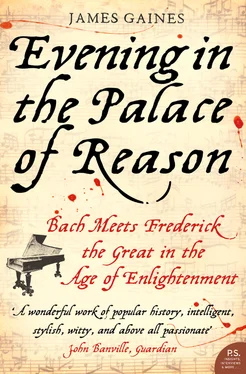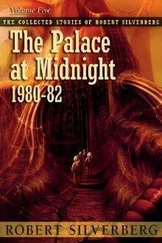His mother’s ability to bring Frederick into her perilous orbit owed a great deal to the fact that he was being physically abused and humiliated by his father. The beatings began when Frederick was twelve, and on a fixed date. Father and son were at a dinner party given by one of the spies, Field Marshal von Grumbkow. (Grumbkow was Frederick William’s war minister, of all things. The other spy was the former imperial ordnance master Count von Seckendorff.) In his cups, the king wrapped his arm around the crown prince and began loudly to give him advice, the rest of the party his audience. According to a dispatch from the Saxon minister to Dresden after the party, as he spoke the king began patting his son’s cheek for emphasis. “Fritz, listen to what I am going to say to you. Keep always a good large army [light tap], you cannot have a better friend and without this friend you will not be able to sustain yourself [harder tap]. Our neighbors desire nothing better than to make us turn a somersault. I know their intentions; you will learn [very hard tap] to know them. Believe me, do not trust in vanity—attach thyself to the real [harder]. Have a good army and money [harder]. In these consist the glory [harder] of the king [harder].” Word of the incident made its way to the capitals of all nations represented at the Prussian court.
From that point on, the beatings became increasingly frequent, humiliating, and severe. He beat Frederick for wearing gloves on a cold day at the hunt. He beat him for eating with a silver fork instead of a steel one. He beat him in front of servants, officers, and diplomats. He threw the prince to the floor and kicked him, berating him at the top of his lungs and beating him with his cane.
Frederick was not his only victim; his fury seemed omnidirectional. For a while it was thought that the king was going completely mad. So violently hostile was he even to his beloved giants that forty of them plotted to roast him alive by burning down Potsdam (a plot that gives us some sense of their collective intelligence). The penalty for desertion was to have one’s skin pinched off with red-hot tongs and then have all of one’s bones broken on the wheel, but there were hundreds of desertions anyway, and suicides at the garrison ran two a month. “The people are greatly discontented,” Rothenburg wrote to Paris. “They hope and believe that this distress cannot endure always. There are all the appearances of a revolution. Everything is preparing for it.”

AT ONE POINT, in one of his most profound depressions, the king began talking of abdication. Grumbkow and Seckendorff (and more so of course their imperial paymasters) were horrified: Should Frederick William abdicate and the crown prince succeed him now, the English alliance would be assured. So the Hapsburg emperor called upon his good friend Augustus the Strong, elector of Saxony, king of Poland, and grandmaster of the revels at one of the most sumptuous pleasure domes of Europe. The king of Prussia needed a rest, the emperor told Augustus, who was more than happy to oblige by sending Frederick William an invitation to Dresden.
Augustus the Strong was no doubt the most debauched ruler in Europe, which for the early eighteenth century is no small claim. His mistresses were legion, his illegitimate children numbered exactly 354, and some of his many daughters had become his mistresses as well. Obviously Frederick William disapproved such goings-on and knew what awaited. He took Frederick with him only because Wilhelmina plotted with the Saxon ambassador to pry an urgent invitation out of Augustus for the crown prince to join him. Frederick, of course, was thrilled with Dresden. He saw his first opera, he held his own in interesting conversation with smart dinner companions, he went to concerts, he even played his flute with the king’s Kapelle. In a letter to Wilhelmina describing the scene (the first letter he signed in the French manner, “Fédéric”), he wrote grandly, “I have been heard as a musician.” In that way and others Frederick greatly upstaged his father, whose most notable accomplishment in Dresden was to split his pants at a ball.
Perhaps Augustus’s greatest gift to the young crown prince came as a result of a joke played on his father. Knowing Frederick William to be something of a prude, Augustus led him to a human diorama, covered at first by a red velvet curtain. When drawn, it disclosed, surrounded by hundreds of candles, the reclining naked figure of a startlingly attractive woman. Accounts differ as to Frederick William’s reaction—he said she was beautiful and blushed, he slapped his hat over Frederick’s face and pushed him out of the room, he huffed out and said he was going back to Potsdam immediately—but we have no trouble imagining Frederick’s reaction. He had already been flirting with a certain very sexy countess who was among Augustus’s illegitimate daughters and favorite mistresses. She was cheating on Augustus with one of her half brothers, but apparently she had time for a crown prince, because Augustus caught her looking. He took Frederick aside and told him the countess was unavailable but asked if he would like to get to know the lady behind the curtain. Frederick said he would. Credible speculation has it that he eventually got to know them both.
If Frederick left Dresden with a smile on his face, it was knocked off in short order. After Dresden, father and son made immediately for the king’s hunting lodge at Wusterhausen. It was a banner hunt that year—the party brought in a grand total of 3,600 wild boar, 450 in one day—and Frederick was miserable. Apparently the king had not changed his attitude toward his son, because during their time at Wusterhausen Frederick wrote a letter to his father, who was in the next room:
For a long time I have not ventured to present myself before my dear papa, partly because I was advised not to do so, but mainly because I … was afraid to disturb my dear papa further by the favor I shall now ask. So I prefer to put it in writing.
I beg my dear papa to be kindly disposed toward me. I assure him that, after a long examination of my conscience, I find not the smallest thing with which I should reproach myself. But if, contrary to my wishes, I have disturbed my dear papa, I herewith beg him humbly for forgiveness, and I hope that my dear papa will forget the fearful hate which appears so clearly in his whole behavior and to which I find it hard to accustom myself. Until now I have always thought that I had a kind father, but I now see quite the opposite. Nevertheless, I shall take courage and hope that my dear papa will think this over and restore me once again to his favor. In the meantime, I assure him that I will never in my life willingly fail him, and in spite of his disfavor, I shall remain with most dutiful and filial respect, my dear papa’s
Most obedient and faithful servant and son,
Friedrich
His father replied:
You know very well that I cannot abide an effeminate fellow who has no manly tastes, who cannot ride or shoot (let it be said—to his shame!), is untidy in his personal habits and wears his hair curled like a fool instead of cutting it … For the rest, you are haughty, as indifferent as a country lout; you converse with no one outside of a few favorites, instead of being friendly and sociable; you grimace like a fool; you never follow my wishes out of love for me but only when you are forced to do so. You care nothing but having your own way, and you think nothing else is of any importance. That is my answer.
Friedrich Wilhelm
There was a terrible amount of animus, posturing, and truth in both letters, and the exchange had the predictable effect, which was none. Frederick did not modify his behavior, and his father kept beating and humiliating him for it. The prince seemed to have brought some illness back from Dresden, speculatively identified as venereal disease. Whatever it was, it laid him low, and was no doubt made worse by the constant battles with his father.
Читать дальше













